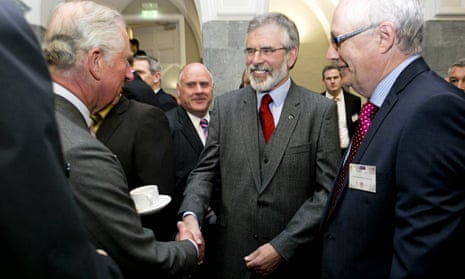Moving on. Putting the past behind us. Overcoming the legacy of history. These are standard platitudes that can be applied to Ireland in the international media these days. They cover a multitude, from Prince Charles shaking hands with Gerry Adams in Galway this week to the referendum on same-sex marriage. And they’re not wrong.
Ireland has changed in remarkable ways in the last two decades. Even in the early 1990s, it would have been impossible to imagine that (when the votes are counted on Saturday) Catholic Ireland just might become the first country in the world to introduce marriage equality by popular ballot. Or that Charles could have a civilised conversation in the west of Ireland with the leader of the movement that murdered his uncle, Lord Mountbatten, there in 1979. These are lovely moments, but a question lingers – when does England get to move on too? The past that Ireland is putting behind it is an English past too.
During the royal visit, Camilla, Duchess of Cornwall went to a preview of a new version of Shakespeare’s Henry plays by Galway’s splendid Druid Theatre Company. It was oddly apt. In those plays, which are so deeply concerned with the formation of English identity, anxiety about Ireland is everywhere. The chorus in Henry V invites the audience to compare the young king’s heroic campaign in France to the struggle that was actually going on when Shakespeare was writing – Elizabeth I’s long war of attrition against the Catholic and Gaelic lords of Ireland. Henry coming back victorious from France, the chorus explains, would be like Elizabeth’s general the Earl of Essex “from Ireland coming,/ Bringing rebellion broached on his sword”. Camilla may or may not have appreciated the parallels but if she did, they may not have been entirely comfortable for her.
What we’re seeing in Ireland is a very long story coming to an end. But it’s not just an Irish story – it’s the woeful tale of the intertwining of religion and politics on these islands. Modern English identity (and, in more complex ways, a later British identity) was tempered in the crucible of embattled Protestantism. Fear and hatred of papists is in its DNA. It could be projected outwards against the Catholic powers of Spain and France, or at the enemy within.
The great failure of the English Reformation was its inability to bring the Irish majority into line. Crudely, Ireland remained majority Catholic while England embedded Protestantism in the very nature of its state. Relations between Ireland and England were profoundly shaped by this sectarian cleavage. To risk a generalisation: Irish people know this in their bones; English people are at best vaguely aware. For the English, the problem of sectarian politics is an exclusively Irish problem.
Well, of course it’s an Irish problem: the Irish inherited from the tangled history of our archipelago a deep identification of Irishness with Catholicism, and of Britishness with Protestantism. We know the consequences because we’ve lived with them. They created the murderous disaster of Northern Ireland, in which the fusion of religious and political identities created a toxic cocktail of blood and bile. They also created, after Irish independence in 1922, a sectarian Catholic state on the rest of the island. The identification of Irishness with Catholicism gave the Catholic church enormous, and enormously corrupting, power. The use of that power had awful consequences for women, for children, for artists, for anyone who fell foul of the church’s moral monopoly. It also fed into a knee-jerk Anglophobia. The English were not just the ancient oppressor; they were Protestants to boot.
But here’s the thing: we in Ireland have been trying very hard to deal with this poisonous legacy. The Northern Ireland peace process is slow and painful and radically incomplete, but it has set in motion an epic change. There is a serious, long-term questioning of the notion that Irish identity is coterminous with Catholicism. This is far from an accomplished thing, but even now there are very few Irish nationalists who don’t know that they must, somehow, find a way of expressing what they believe in a way that includes, and appeals to, Irish Protestants.
And in the republic, we’ve actually been dealing with the legacy of our sectarian state. If, this evening, Ireland does declare itself the first state in the world fully to embrace its gay and lesbian citizens by free popular vote, it won’t be by accident. For two decades now, Irish people have been going through the difficult, painful but deeply democratic process of disentangling church and state. It’s a hard and bumpy road, but we’ve stayed with the journey – and maybe tonight it will reach at least one joyful conclusion. Even if it doesn’t, we know that this process has had at least one good outcome: Irish people have ditched Anglophobia. The religious divide does not separate us any more.
Most Irish people are too polite to ask this question – but where’s England in all of this? It’s nice to be patted on the head and told how well we Irish are doing with “moving on” from the divisions of the Reformation. But how are you folks doing with this yourselves? Why can we watch Wolf Hall as ancient history while for you it’s still current affairs? We’ve reached a point, through blood and tears, where we know what’s wrong with having a sectarian state with, for example, a state church headed in turn by Charles and William and George. How long will it take you to join us in cleaning up the strange detritus of our shared past?

